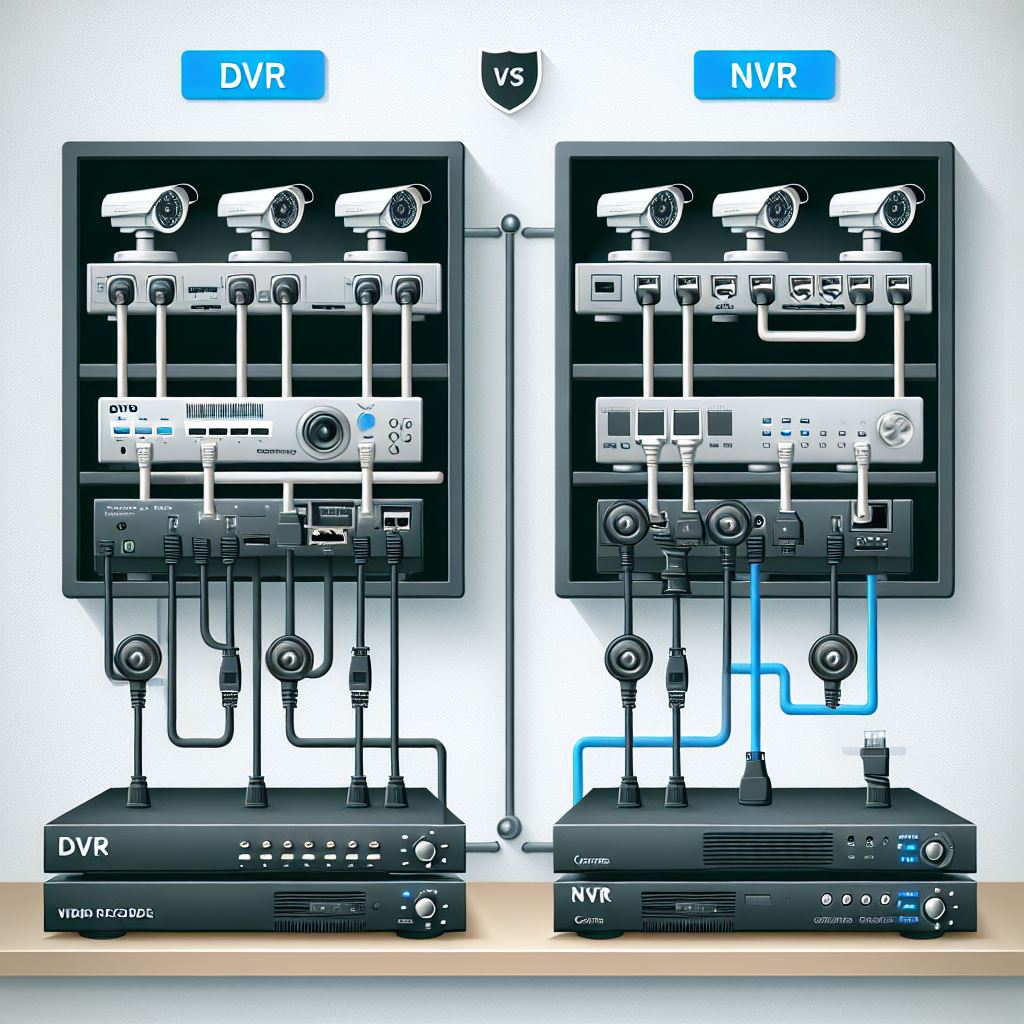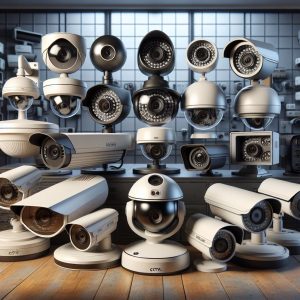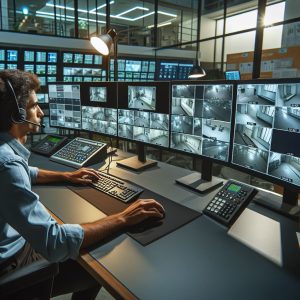Choosing the right security camera recorder is key to setting up a successful video system. Whether you are building a camera system from scratch, or considering an update to your existing security system, you will need a recorder to manage the footage.
Security camera systems vary depending on the CCTV cameras, cables and recorders you choose. There are many different variations, but overall, there are two systems: those with analog cameras and digital video recorders (DVRs), or internet protocol (IP) cameras, such as dome or bullet cameras, and network video recorders (NVRs).
Both DVR recorders and NVR recorders enable you to view and store digital footage. The main differences include camera choice, cabling and installation, how they process video, and running costs.
What is DVR or Digital Video Recorder?
A digital video recorder, or DVR, is generally used with analog security cameras. Analog video signal needs to be digitally encoded before it can be stored, so a DVR camera recorder encodes the signal, stores it, and also decodes it for remote viewing on demand or is an electronic device that records video in a digital format. It can store video on various types of storage media, such as a disk drive, USB flash drive, SD memory card, or SSD. DVRs are commonly used with set-top boxes to record television programs, allowing users to pause, rewind, and fast-forward live TV, as well as schedule recordings for future viewing.
PROS for DVR or Digital Video Recorder
- Cost-Effective Set Up: Compared to NVR, cloud, and hybrid cloud systems, DVRs are generally a more affordable security solution for small businesses. While the overall cost can vary depending on the number of cameras needed and professional installation, DVR systems benefit from working with lower-cost analog cameras, leading to initial cost savings.
- Secure Connections: Analog DVR camera systems function independently, unlike other systems that rely on internet connectivity. This allows for setup in almost any location, including remote areas, as long as a power source is available. This lack of network dependence enhances security by eliminating the risk of hacks aimed at the surveillance system.
- Instant Access: DVR systems utilize a hardwired connection between the DVR and CCTV cameras. This enables real-time video storage on a local hard drive, providing easy and immediate footage access. On-site surveillance personnel can review recordings as soon as they are captured.
- Special Features: While potentially appearing less advanced than other options, DVRs can still be configured with various features that improve usability. Motion detection and time stamping capabilities are prime examples. These features help alleviate the burden on surveillance staff by eliminating the need for constant monitoring or manually sifting through hours of footage to locate specific incidents.
CONS for DVR or Digital Recorder
- Lower Video Quality: Typically, lower resolution compared to NVR.
- Complex Cabling: Requires separate cables for power and video.
- Limited Features: Fewer advanced features like audio recording and motion detection.
What is NVR or Network Video Recorder?
An NVR is a specialised device that records video footage from IP (Internet Protocol) cameras, which are commonly used in modern CCTV systems. Unlike older CCTV cameras that rely on analogue signals, NVR CCTV processes digital video streams directly from the cameras through a network connection. This means the video data is transmitted over a local area network (LAN) or the internet.
NVR CCTV receives and stores video data from IP cameras via a network. The footage is encoded and transmitted in a digital format, allowing it to be viewed and managed remotely using software or an app. NVRs can be connected to the same network as your cameras through a wired Ethernet connection or wirelessly in some systems.
PROS for NVR or Network Video Recorder
- Scalability and Flexibility: NVR systems are inherently scalable. As they operate over a network, adding additional cameras to the system often simply requires ensuring the camera is on the same network. There is no need for direct cabling to the recorder, as is often the case with traditional DVR systems.
- Higher Resolution Recording: Given that NVRs are designed for IP cameras, they inherently support higher-resolution video. IP cameras tend to offer superior resolution compared to their analogue counterparts, ensuring crisper and more detailed footage.
- Centralized Management: With an NVR system, video footage from multiple IP cameras—regardless of their physical location—can be centralized and accessed from one unified platform. This centralization streamlines the process of managing and reviewing footage.
- Remote Accessibility: One of the standout features of NVR systems is the ease of remote access. Via the network, users can view live or recorded footage from virtually anywhere, given the appropriate software or application and necessary credentials. To ensure continuous monitoring and security, explore our CCTV monitoring services, which provide around-the-clock surveillance options. Our team is equipped with the expertise and technology to offer you the best in surveillance and peace of mind.
- Enhanced Security: NVRs, paired with IP cameras, offer advanced encryption methods. This ensures that video transmission over the network remains secure, mitigating risks of unauthorised access or data breaches.
- Efficient Storage Solutions: NVRs provide a range of storage solutions, from built-in hard drives to cloud storage integrations. Their design allows for optimization in storage utilization, often employing techniques like motion-based recording to save space.
- Integration with Modern Infrastructure: As a network-based system, NVRs can seamlessly integrate with modern IT infrastructure. This facilitates easier collaboration with other systems and software, potentially offering functionalities like advanced analytics.
CONS for NVR or Network Video Recorder
- Higher Cost: More expensive than DVR systems.
- Compatibility: Requires IP cameras, which are generally more expensive.
- Complex Setup: Can be more complex to set up for larger systems.
Which CCTV Recorder Should I Choose – NVR or DVR?
NVRs and DVRs are both great options for a reliable security camera system. It used to be if you wanted higher resolution you would go for an NVR, however DVRs have caught up in resolution and provide a lower cost alternative. The biggest deciding factor will depend your cable preferences. If there is existing cabling that is already in place it and it is good quality RG59 coax, it will sway your decision towards a DVR if you want to keep the existing cameras and some HD IP cams later on. However, if replacing the cable is a task that you’re comfortable with, then an NVR would be the way to go as network cable provides the simplicity of PoE. The below image summarizes the cabling differences between a DVR and NVR.
For most modern businesses and homes, an NVR system is a preferable option.
They offer far greater flexibility and don’t necessarily require a direct physical connection between the camera and the recorder. IP cameras capture better quality footage and stream data to the recorder wirelessly, provided they are on the same network.
That means you can install multiple cameras, in different places, and even across various sites, all streaming CCTV captures back to the same NVR recorder.
While both NVR and DVR CCTV recorders are reliable, if you’re looking for better video quality, more reliable data transmission, faster installation, and wireless technology, your best bet is the NVR.
DVR systems are sufficient for straightforward security systems since they are generally cheaper.
This sort of CCTV recorder is ideal for properties already wired for coaxial cables – since this more complex installation often requires significant drilling and can take longer to install than an Ethernet cable for a contemporary NVR recorder.
A lot depends on your CCTV budget, what sort of footage you anticipate capturing, and whether wireless technology is crucial to your security strategy.
Need assistance from a Professional?
Experience unmatched safety and peace of mind with Garrison Alarms, New Zealand’s trusted partner in cutting-edge home and business security solutions. With over 35 years of expertise, we offer state-of-the-art CCTV systems, burglar alarms, and access control tailored to your unique needs. Our professional team ensures seamless installation and reliable monitoring, protecting what matters most to you. Choose Garrison Alarms for unparalleled security and exceptional customer service. Secure your property today with the best in the business! Visit Garrison Alarms for more information.





